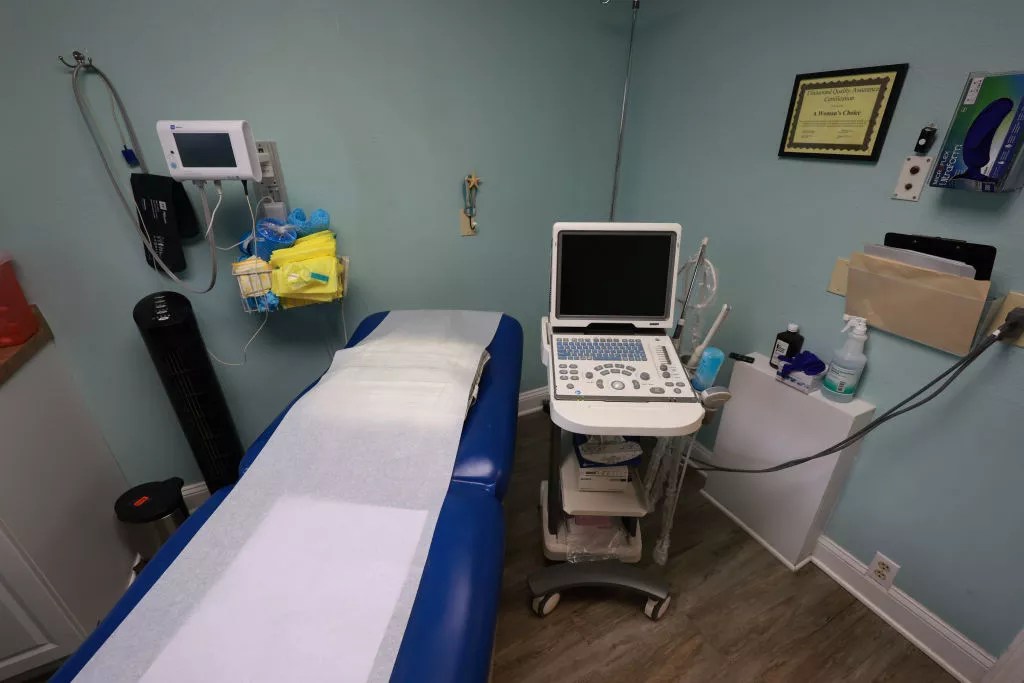
Joe Raedle/Getty Images

Audio By Carbonatix
Texas women experiencing a miscarriage during their second trimester stand a significantly higher risk of developing sepsis, a potentially life-threatening infection that can trigger organ failure, than they did just five years ago, an investigation published this week by ProPublica found.
According to the newsroom’s analysis of statewide hospital data, sepsis cases in miscarrying patients increased by 50% after Texas’ statewide near-total abortion ban was put into place in 2021. The World Health Organization currently lists sepsis as the third leading cause of maternal mortality globally.
Studying all hospitalizations that included miscarriages, terminations and births between 13 and 22 weeks’ gestation, ProPublica found that women whose fetus was not pronounced dead at the time they were admitted were especially susceptible to developing sepsis.
Under those circumstances, the rate of septic diagnoses increased from 3.7% in 2017 to 6.9% in 2023. For women who did receive a fetal death diagnosis at the time of hospital admission, the sepsis rate rose from 2.1% to 3.1% in the same years. Prior to Texas’ abortion ban going into effect, the rate of sepsis for both diagnoses had held steady around that 2017 number.
“What [ProPublica’s data] says to me is that once a fetal death is diagnosed, doctors can appropriately take care of someone to prevent sepsis, but if the fetus still has a heartbeat, then they aren’t able to act and the risk for maternal sepsis goes way up,” Dr. Kristina Adams Waldorf, professor of obstetrics and gynecology at UW Medicine, told the newsroom. “This is needlessly putting a woman’s life in danger.”
For Ryan Hamilton, a North Texas-based abortion rights advocate whose wife was denied care while miscarrying in early 2024, the ProPublica investigation felt personal. His wife nearly died from blood loss despite the couple seeking care at multiple emergency rooms and with multiple doctors.
At a panel organized by the Post-Roe activist group Free & Just Thursday, Hamilton told the Observer he was especially disturbed to read ProPublica’s findings after considering the way doctors ignored his wife’s increased risk of developing sepsis while experiencing her miscarriage.
“[The doctors] knew her condition, they knew the risk of sepsis,” Hamilton said. “Afterwards, when you look back, you can’t believe certain things that happened, and that was a big one for me.”
He feels there is a lack of accountability surrounding Texas’ abortion ban, and continues to feel “shocked” that data such as the increased risk of sepsis has to come from journalists “digging for it.”
Last December, Texas’ Maternal Mortality Committee announced that deaths from the years 2022 and 2023, the first years after Texas’ total abortion ban was put into place, would not be investigated. The committee announced they would “leapfrog” the years in order to stay contemporary in their medical analysis, and that the extensive nature of their investigations often meant years be left behind.
Maternal health experts and abortion rights advocates lamented the decision, stating it would interfere with collecting data that could help better understand the full impact of the state’s abortion ban. Dr. Austin Dennard, a Dallas-based OB-GYN who was one of 110 Texas practitioners to sign a letter urging state lawmakers to rethink the state’s approach to abortion legislation, said the committee’s decision raised “enormous red flags.”
“I don’t disagree that it takes a lot of energy to review these cases, but they’re important to review. Any scientific person or anyone in medicine will tell you that we learn from data, we learn from research, and these retrospective cases are enormously important,” Dennard told the Observer at the time. “If we don’t have data, we’re just presuming that [the rise in maternal mortality is] related directly to these abortion bans.”
Various surveys have shown that as many as 70% of practicing OB-GYNs in Texas feel the abortion ban has negatively impacted their work. The law puts them in a difficult position; if a doctor performs an abortion that is deemed unnecessary, they could face jail time, excessive fines and the loss of their medical license.
“[The doctors] knew her condition, they knew the risk of sepsis … Afterwards, when you look back, you can’t believe certain things that happened, and that was a big one for me.” – Ryan Hamilton
ProPublica’s investigation mirrors a conclusion other researchers have been coming to. At the University of Texas Health Science Center in Houston, sepsis rates are believed to have tripled after Texas Senate Bill 8, the law that bans abortions after the detection of a fetal heartbeat, went into effect.
Even without the review of an official state agency, legislators may finally be starting to take notice.
Last month, Lt. Gov. Dan Patrick told WFAA’s “Inside Texas Politics” that he is in favor of clarifying S.B. 8 to better inform doctors on the types of scenarios when performing an abortion would be appropriate so they “are not in fear of being penalized” if they think a woman’s health or life is at risk.
“As long as Texas’ abortion ban is in place, more women, especially Black women, will bear the deadly consequences. When lifesaving care is criminalized, the health and safety of patients is jeopardized,” Marsha Jones, executive director of the North Texas reproductive rights organization the Afiya Center, told the Observer. “The data and medical experts are clear. Now, we need Texas lawmakers to act and put the safety of our communities above political interests.”